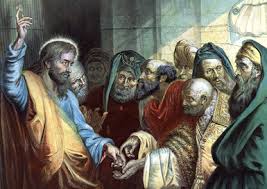19-21 October 2014
Homily of the Apostolic Nuncio
His Grace Archbishop Petar Rajič
Is 45:1,4-6; 1 Thes 1:1-5b; Mt 22:15-21
A very provocative question is put forth to Jesus in today’s Gospel reading by the Pharisees who wanted to put him to the test. Their intention was to see whose side Jesus was on, that of the people or of the Roman occupying authorities.
The reply Jesus provides surprises those who heard it, for it came unexpectedly and at the same time, was so profound and logical. Jesus says: Repay to Caesar what belongs to Caesar and to God what belongs to God. The Lord’s reply is given in strong terms because he speaks in the imperative form – repay, which means, pay back, reimburse, refund, what belongs to Caesar and also to God. One may ask why? Because nothing we possess is truly ours. Jesus shows his wisdom by changing the verb “to pay” into “to repay” and thereby changes the whole approach to their thinking and way of living.
If we reflect deeply on this thought we can see that it is indeed true. None of us can say that we are masters of our own existence. Everything we are and all that we have is a gift, which we have received from those who existed before us and will continue on after we depart from this world. Even our very existence is not our right but rather a debt or duty. We are all in debt to God, to our parents and friends, to our educators and the culture we have received through them. We owe our existence to God who created us through the love of our parents who have taught us the basic essentials of life and loving. Our teachers and educators have shared with us their knowledge and wisdom in order to educate and shape us into wise and cultured people. Even the work we do for our living is also a continuation of someone else’s efforts who preceded us. Looking at our local Church community, we can see that we enjoy today the fruits of the seeds that were planted here by the previous bishops, priests and lay faithful, who did their best to build our parish community and churches for the good of all. Hence we are called to repay our debts to both the Lord and to our modern Caesar that is, to mankind, the world and society we live in.
What then, can we give back to the world and mankind? As Christians we are always called to be good citizens of the countries we live in by being responsible, honest, trustworthy, active and noble members of society, working towards the wellbeing of all.
Yet what are we to do though if the society we live in and its leaders are corrupt and do not act according to the will of God and Christian teaching? We are then called to be an antiseptic or cleansing factor in society that will help correct these wrongs by living an exemplary life and pointing out in peaceful and wise ways that which is wrong, in order to remind those in authority of their responsibilities and hopefully to correct them for the better.
How are we to repay God for everything he has done for us? This is the main point Jesus wants to stress to those who provoked him then, which is a good lesson for us today. We give to God what belongs to God – our entire being. Yes each of us has been created in the image and likeness of God and we are invited to pay back to the Lord our God nothing less than ourselves, our very lives, expressed by our loyalty, allegiance and faithfulness to him. By doing so we are only giving back to God what we have already received from him: our bodies and souls, our hearts and minds, that are slowly developing into a beautiful image of Christ shining brightly within us.


